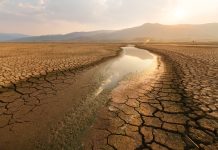Emerging research indicates that climate change impacts on mental health an increasing global concern
Climate change is increasingly recognised as one of the greatest threats to human health of the 21st Century, with wide-ranging impacts on individuals, communities, and health systems globally. The latest synthesise evidence from the Intergovernmental Panel on Climate Change (IPCC) (2014) indicates increasing global temperatures are leading to more variable and extreme weather conditions including drought, heat waves, and extreme cold; increased frequency and severity of storms, including hurricanes; sea-level rise, leading to displacement, infrastructural damage, and economic loss; and melting sea ice, glaciers, and permafrost, leading to flooding, impacts to coastlines, and changing environmental conditions.
These changes have been linked to a variety of physical health impacts, including increased risk, prevalence, and distribution of foodborne, waterborne, and vector-borne disease; decreased nutritional opportunities from agricultural losses; morbidity and mortality from extreme weather events and heat-related stress and violence; increased risk for cardiovascular illness and respiratory illness; and potential for violence from displacement and forced migration. Clearly, climate change is becoming a defining issue for the health sector – but what about mental health?
Climate Change: The Next Challenge for Mental Health?
Emerging evidence is indicating that climate change and the related environmental changes will impact mental health and psychological wellbeing through multiple pathways, with expectations that the impacts will be widespread with long-lasting human suffering and high economic costs. Although knowledge is still limited about the ways in which climate change will impact mental health, there is consistency in the emerging research and projections from scientists, researchers, communities, organisations, and healthcare professionals on current and anticipated pathways and mental health outcomes:
– Natural disasters and severe storms, leading to widespread displacement, enduring psychological impacts, post-traumatic stress disorder, and increased conflicts;
– Heatwaves and changing temperature regimes, resulting in increased aggression, conflict, violence, anxiety, depression, morbidity and mortality;
– Prolonged droughts, resulting in increased stress, anxiety, depression, suicide, addictions, family stressors and violence, and conflict from migration;
– Secondary impacts, including physical health impacts, from increasing air pollution (asthma, respiratory ailments, allergies) and increased morbidity and mortality, leading to a range of psychological impacts; and infrastructural damage and land loss, leading to displacement, migration, and potential conflict.
In particular, children, women, the elderly, the poor, and those who rely on the natural environment for sustenance and livelihoods (e.g. fishers, farmers, subsistence hunters, and Indigenous populations) are considered most vulnerable to the psychological stressors of a changing climate and environment.
Case Study from the Circumpolar North
Indigenous populations across the Circumpolar North and in the Arctic 8 countries have been at the frontlines of global climate change, experiencing rapid changes in seasonal temperatures, leading to later freeze-up and the earlier breakup of the sea ice, and overall declining sea ice coverage. The weather has also become increasingly unpredictable, with more frequent and extreme storms. As a result, travel is more dangerous, and many Indigenous populations are finding it increasingly difficult to travel safely to hunting grounds, feed their families, and maintain subsistence livelihoods and cultural practices. For populations who rely on the land for sustenance, livelihoods, and connection to cultural and ancestral knowledge, even subtle alterations in environmental conditions can have devastating impacts.
From multi-year collaborative research conducted with the five Inuit communities of the Nunatsiavut region of Northern Labrador (population 2,600; 4% of the Canadian Inuit population) in Canada on the impacts of climate change on Inuit mental health, four main pathways were discovered:
– Strong emotional responses, including sadness, stress, distress, fear, anxiety, grief, and depression, due to the changing land and environment, concerns over travel safety, the loss of cultural connections to land-based activities, and the disruption to traditional knowledge transmission among generations;
– Increases in drug and alcohol usage, linked to people coping with the pain from no longer being able to access the land for hunting, trapping, fishing, and foraging and the loss of cultural identity, as well as filling ‘empty’ time that would have previously been filled with land-based activities;
Potential increases in suicide ideation and attempts, linked to the strong emotional responses, the pain of losing cultural practices and traditions, and the loss of identity and self-confidence related to no longer being able to provide for family and community; and
– Magnification of other already-present mental health challenges, stemming from intergenerational trauma, pre-existing personal trauma, and the loss of regular land access, which is a strong mental health coping strategy.
Moving Forward: Mental Health Adaptation
Climate change represents an unprecedented challenge for global mental health. The mental health impacts of climate change need to be prioritised, as they are no longer abstract; people around the world are already experiencing a wide range of psychological responses. We need to prepare our health systems, our policies, and our populace for coping with the mental health impacts of climate change and begin to divert significant resources to this area. Governments, decision-makers, researchers, and healthcare providers have the opportunity and the responsibility to work together through inter-sectoral partnerships and collaborations to promote resilience and to create and support educational and advocacy campaigns for those working in the healthcare and health decision-making sectors.
Key Partners & Collaborators
Jack Shiwak & Charlotte Wolfrey, Rigolet Inuit Community Government.
Inez Shiwak & Marilyn Baikie, ‘My Word’: Storytelling & Media Lab.
Herb Jacque & Myrtle Groves, Makkovik Inuit Community Government.
Diane Gear & Greg Jacque, Postville Inuit Community Government.
Wayne Piercy & Juliana Flowers, Hopedale Inuit Community Government.
Anthony Andersen & Noah Nochasak, Nain Inuit Community Government.
Michele Wood, Nunatsiavut Department of Health & Social Development.
Funding
Health Canada First Nations & Inuit Health Branch. Nasivvik Centre for Inuit Health and
Changing Environments. Canada Research Chairs.
Canadian Institutes of Health Research (CIHR).
Nunatsiavut Government Department of Health and Social Development. ArcticNet.
Cape Breton University
Ashlee Cunsolo Willox, PhD
Canada Research Chair in Determinants of Healthy Communities
Assistant Professor of Community Health
Departments of Nursing & Indigenous Studies
Cape Breton University
Tel: +1 902 563 1949
ashlee_cunsolowillox@cbu.ca











